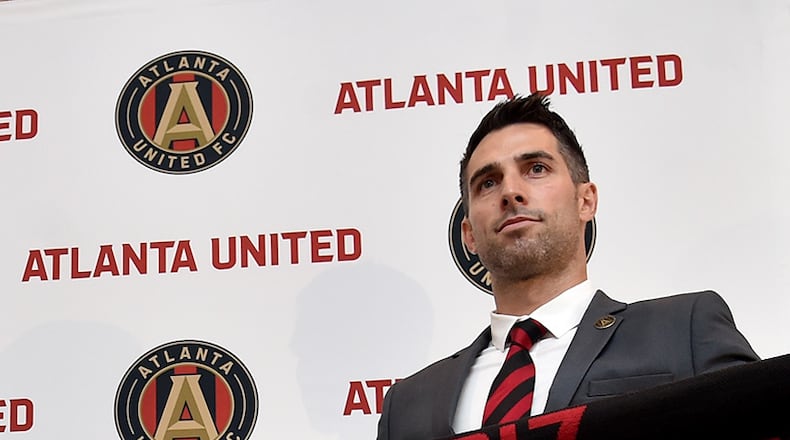Carlos Bocanegra will be inducted into the National Soccer Hall of Fame on Saturday.
But on Monday, the Hall of Famer was doing what his parents, Manuel and Kelly, used to do when his soccer career began 37 years ago in Rancho Cucamonga, Calif: driving home to take one of his kids to soccer practice.
Life can be as circular as a soccer ball.
Speaking on the phone while on his way home, Bocanegra sounded excited about taking his kids to practice. That humility and love of family are two of the reasons that he thrived on the club scene in southern California as a four-sport star. That’s why he was invited to the U.S. Under-18 national team after he was accidentally scouted by Sigi Schmid, who then signed him at UCLA after he turned down numerous scholarship offers to play college football. That’s why he became a rookie of the year at Chicago in MLS. That’s why he succeeded at numerous well-known clubs in Great Britain and Europe, and led the U.S. to some of its biggest wins.
“I haven’t had too much time to just sit down and think about it, but it’s really special,” he said. “I’m pretty pumped up because for my parents. I know how it is taking kids around to soccer practice or dance and the dedication that it takes and how much sacrifice for the parents put into it. So, I think that’s one of the big things for me that I’m pumped up about that.”
From those soccer practices with the California Kickers when he was 5 years old, Bocanegra crafted a career that resulted in him being the lone member of the 2020 class. Because of the COVID-19 pandemic, there were no inductions last year.
Summing up the playing career of one of the players to be dubbed “Captain America” is difficult because there are so many highlights. Here are a few:
- 110 appearances with the U.S. men’s national team. He was captain 64 times.
- Two World Cups.
- 14 goals for the U.S. are its record for a defender.
- Gold Cup champs in 2002 and ‘07.
- Captain of the U.S. team that beat No. 1 Spain at 2009 Confederations Cup.
- MLS Rookie of the Year in 2000 while with Chicago.
- MLS Defender of the Year in 2002 and ‘03.
- Two U.S. Open Cups.
- MLS Supporters Shield.
“He got the most out of the gifts he was given,” said Darren Eales, president of Atlanta United and the man who hired Bocanegra as the team’s first technical director. It also was Bocanegra’s first “office” job after he retired in 2014. Bocanegra’s success as a player continued behind a desk as he helped build a club that has won three trophies while also working with the U.S. Soccer Federation.
“He was someone that was dedicated to his craft 110 percent,” Eales continued. “In terms of effort, and energy, he was a real leader. And I think he showed that wherever he went, whether that was Rangers (Scotland) or St. Etienne (France). But with the national team in particular, was where you really saw his strengths of his personality, and you know, what he brings to a team.”
Former U.S. teammates Stu Holden and Brad Guzan, who like Bocanegra made the move from MLS to play for clubs in England, said that he would bring the team together with his personality, likability, and his desire to win. In what may be surprising to some Atlanta United supporters because Bocanegra doesn’t often do interviews, Holden said he was very vocal on the pitch, more than off the field at times.
“I was fortunate enough to be on the field with him and understand what he brought to the team in terms of his experience, but also his calmness and his professionalism,” said Guzan, Atlanta United’s goalkeeper. “I remember, you know, going into 2008-2009 (World Cup qualifiers). And knowing that when we were on the plane headed to Central America, we were going to get a result. We may not have won the game, but we weren’t going to lose the game. And it was because of players like Carlos and his ability to demand more out of guys around them and ultimately get the job done.”
Credit: ALASTAIR GRANT
Credit: ALASTAIR GRANT
The early years
To understand how Bocanegra became a Hall of Famer, and he laughed when asked if he considered himself to be one, it’s necessary to go back to his childhood.
Bocanegra’s older brother, Diego, also played soccer. When Diego, who is four years older than Carlos, would be at games or practices, his little brother was on the sidelines playing with the younger brothers of Diego’s teammates.
When there weren’t team-affiliated activities, the boys in the neighborhood, located about 30 miles from the Rose Bowl, would go and play soccer or whatever sport was in season.
When Carlos Bocanegra was 9 or 10 years old, he began playing up an age division in soccer. When he was 13, he was playing against 16-year-olds and, Diego Bocanegra said, getting his “butt kicked.”
And then Carlos Bocanegra turned 15 and began to grow.
Suddenly no longer was he Diego Bocanegra’s little brother. He became his younger brother. He started dishing out what he had been receiving.
“I was setting the pace in a way, but he’s a freak athlete,” Diego Bocanegra said. “His junior and senior year in high school, some of the things he could do athletically, it was obvious there was another level.”
Multi-sport success
Blessed with what his older brother said were “tree trunks” for legs, Bocanegra played four sports: soccer, football, baseball and track and field. His dad coached several sports.
As a wide receiver, defensive back and kicker in football, he was good enough to receive scholarship offers from San Diego State, San Jose State and several FCS-level schools.
Diego Bocanegra said he wasn’t sure that soccer was Bocanegra’s full focus at the time.
That soon changed.
Diego Bocanegra played at UCLA. One day, Bruins coach Schmid told him that he was off to scout the club team that his younger brother played on. The two had never spoken about him. Schmid actually was going to scout Nick Rimando and Ryan Lee.
Schmid returned and told Diego Bocanegra: “Your brother blew me away,” Bocanegra said. “I’m bringing him into the U-18 national team. I had no influence on Sigi. He blew Sigi away that much.”
Carlos Bocanegra said he realized that soccer might be a better choice considering his size and that with soccer, he probably could attend a more prestigious school and get a better education.
“I wasn’t even really honestly thinking about the professional game,” he said.
Bocanegra signed with UCLA. He broke into the starting lineup as a freshman in 1997. The Bruins won a national title.
“We started playing the next year, I was like, ‘OK, I feel like I’m doing all right,” he said modestly.
In 1999, Bocanegra played for the U.S. in the U-20 World Cup in Nigeria.
He began thinking about trying to become a professional soccer player.
Bocanegra said that without Schmid, who died in December 2018, he likely wouldn’t eventually have been voted into the Hall of Fame.
“He set me on track to be a professional,” Bocanegra said. “He was a big, big influence on a lot of things. The conversations he had with us, and how to approach training sessions. How to approach a game. What you’re doing off the field, really just trying to prepare us to be young professionals.”
Establishing himself as a pro
Bocanegra was drafted by Chicago with the fourth selection of the first round in the 2000 MLS draft. The team won the U.S. Open Cup and played in the finals of the MLS Cup.
After four seasons, three trophies, three awards, five goals and eight assists, he signed with Fulham in England’s Premier League in January 2004.
His first game, Jan. 19, 2004, he was tasked with marking on set pieces Newcastle’s Alan Shearer, who later retired as the most productive goal-scorer in Premier League history. Fulham lost 3-1, but Shearer didn’t score.
Soon followed battles with Thierry Henry, Didier Drogba and Cristiano Ronaldo.
Bocanegra never blinked.
Diego Bocanegra said his brother always was ready for the challenge because, until he was 17 or 18 years old, he wasn’t focusing exclusively on the sport.
“He never idolized soccer players while he was growing up,” Diego Bocanegra said. “He always saw himself as being on the same level.”
Carlos Bocanegra thrived at Fulham despite having to win the trust of three managers: Chris Coleman, Lawrie Sanchez and Roy Hodgson.
Bocanegra was more than just a stout defender. He also was an offensive threat, scoring eight goals, including five during the 2005-06 Premier League season. Fulham’s supporters dubbed him “The Jackal.” Bocanegra was very good capitalizing on set pieces, where his leaping ability, timing and strength to outmuscle the midfielders who typically marked him, were assets. Bocanegra said his favorite goal came on a header while with the U.S. against Honduras in a World Cup qualifying game in front of 80,000 at Soldier Field, which was his MLS team’s home field.
Diego Bocanegra said he thinks that ability to win headers came from his brother’s time spent playing other sports such as football and baseball in which he often had to track the flight of balls.
Bocanegra would make 136 appearances for the Cottagers across all competitions.
“You’ll be a fan of a club, and there’ll be a player and you’re like, for whatever reason you think, why is he always getting into the team and you realize that there are certain players that a manager can trust, and there’s that level of trust,” Eales said.
“He was going to be someone that you could rely on, and he was someone that was, in that dressing room, going to be a leader, and that’s the bit that you don’t always see when you’re on the outside looking in as a supporter. You’re not seeing the day-to-day training, the getting there early, putting in the work. I think that sometimes there’s certain players that succeed, where they succeed and get the trust of the managers because they are that type of character. I think Carlos is definitely one of those.”
Bocanegra worked non-stop. During the few weeks he would have off between seasons, when he’d return home to California and his friends would want to get together, Bocanegra said he would tell them that he needed to get his run in first. So, they would hop in a SUV and drive beside Bocanegra as he ran, blasting music.
Bocanegra went from Fulham to Stade Rennais and then Saint-Etienne in France from 2008-11. He said Stade de France is among his favorite stadiums because of the quality of football and atmosphere, with the Rose Bowl a close second because of its location and proximity to friends and family.
He moved from France to Scotland to play for Rangers in one of his favorite cities, Glasgow. Rangers loaned him to Racing de Santander in Spain for a while. Bocanegra then left Rangers to come back to MLS to play for Chivas USA. In a testament to his professionalism, Bocanegra appeared in 446 games across all competitions for clubs from 2000-14, with 24 goals scored.
“He’s putting himself in different circumstances that a lot of people wouldn’t even make that jump,” Eales said. “But then he actually came back at the end. What he did as a player both domestically, but internationally, and then with his time on the board with U.S. Soccer (Federation), he’s someone that really has done everything he can for U.S. soccer. He’s someone that loves the game of soccer and has given back in a number of ways. He’s shown a commitment. He’s not just talking. It’s not just putting his views out on Twitter. He’s like, he’s done the hard graft, and he’s done the work to try and improve the game.”
Recognition for career played well
Bocanegra hadn’t yet written his acceptance speech as of Monday.
He had been thinking about it, and said it would include all of the people that helped him along his journey, including his parents, his brother, his wife and kids, his friends that he grew up with, his coaches and teammates. He said everyone sacrificed so much for him to play soccer.
He sees it now that he’s a parent.
“It’s my life,” he said. “It’s given me everything. I love it. I’m pumped that, you know, I was able to have a career and playing overseas and with the national team and now be able to work in the sport at the highest level in our country and hopefully be leaving a legacy on the game. I don’t really think about it so much like a Hall of Famer, but I feel really fortunate to be in the game this long at such a high level.”
About the Author
Keep Reading
The Latest
Featured





